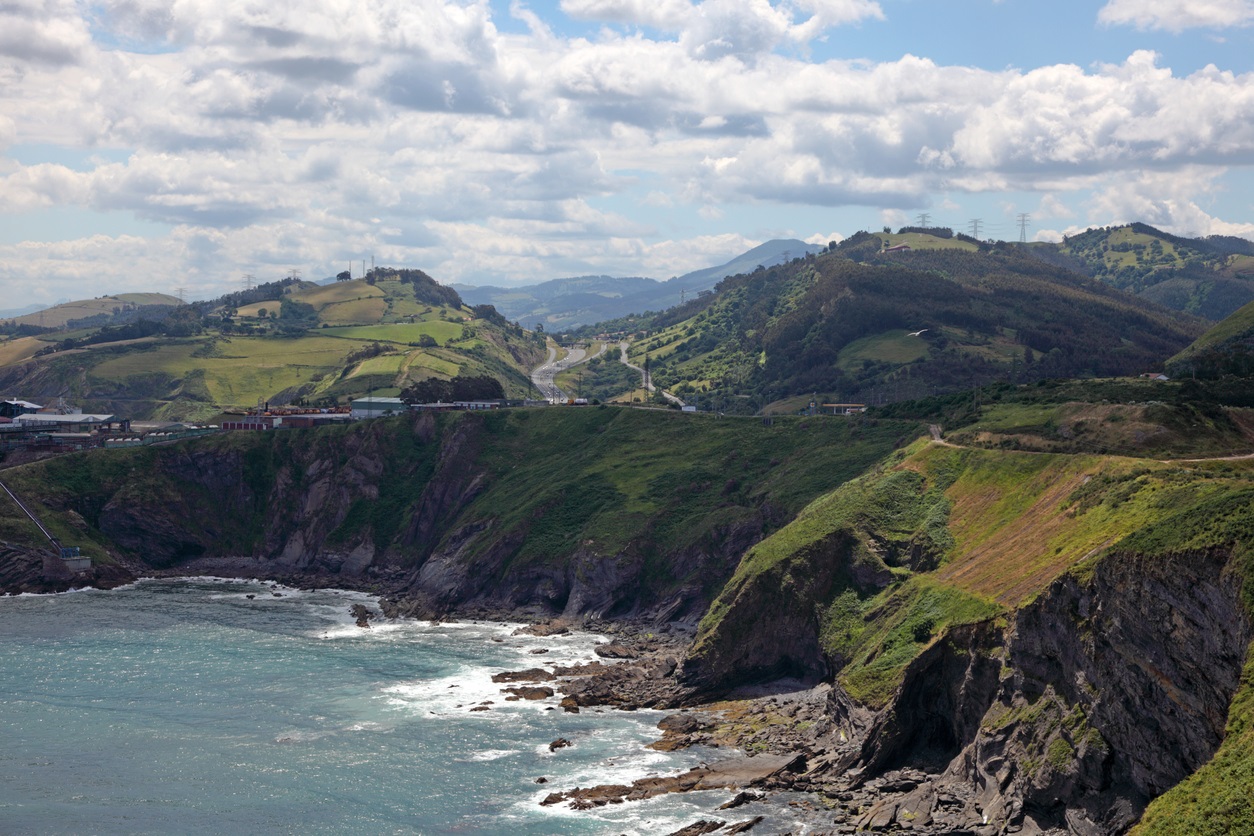Featured: A glimpse of what you can expect along the Costa Verde near Castro Urdiales in Cantabria, Spain.
In the middle of the 20th century, Spain built a tourist industry and an economy on the allure of its coasts, or costas. The attraction of Mediterranean beaches and long stretches of golden sand was irresistible to sun-starved northern Europeans, who flocked there in their millions.
The drawback turned out to be that word, ‘millions.’ Over-development and high-season crowds have meant it’s not always easy to appreciate the charms of the Costa Brava, Costa Blanca, or Costa del Sol. Discerning visitors have looked elsewhere, and increasingly their gaze has drifted northwards.
RELATED: Best Wineries in Spain, Vineyard Resorts & Tours: Spain Travel Guide
Winetraveler Tip: Can’t get enough of Spain? Want to learn about other special Spanish destinations? Take a look at a wide range of articles and travel guides related to Spain right here.
The Beaches and Coves along Asturias to Cantabria
Spain’s Costa Verde is a long stretch of alluring beaches on what locals call the Cantabrian Sea, possibly because it sounds a little less cold than the Bay of Biscay. The water is never going to reach the balmy temperatures of the Mediterranean, but on a hot July or August afternoon, the chill of the clear turquoise sea is welcome and the broad expanses of fine sand lack only one aspect of the southern costas: the crowds.
This is the province of Asturias, an ancient and serene land of picturesque fishing ports such as Llanes, Cudillero, and Luarca, and lush dairy pasture, shaded by the nearby ridges of the Picos De Europa.
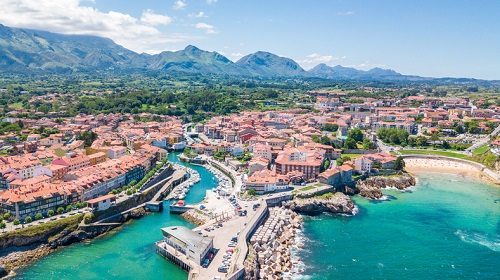
The Costa Verde stretches over 200 miles across the region, touching the neighboring provinces of Cantabria to the east and Galicia to the west. Beaches are abundant, although they occasionally need a little work to find, nestled between outcrops of rock or hidden at the estuary of a river descending from the Picos.
A classic example is the Playa De Póo just west of Llanes, a name that inspires initial mirth among English-speakers, quickly followed by delight at the beauty of the beach. It is a spotless stretch of tidal sand, flanked and protected by cliffs with caves at their foot. The headlands break up the rough waves and the shallow sloping beach warms the water, making it the perfect environment for families to spend an idyllic day. Discreet cafe bars offer shelter if the sun gets a little intense or a Biscay rainstorm blows in.
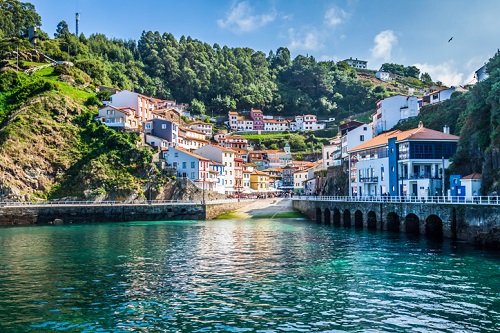
RELATED: How To Plan a Vacation With Family Involving Wine
Heading further west, Niembro initially seems unpromising, a sleepy village on a silted-up estuary. Its secret beach, Toranda, is accessed by a path between wooded cliffs. It’s a pristine stretch of white sand, less sheltered than Póo, with choppier waters. Local surfers gather here to catch a wave and tell tall tales at the relaxed beach shack cafe, the chiringuito.
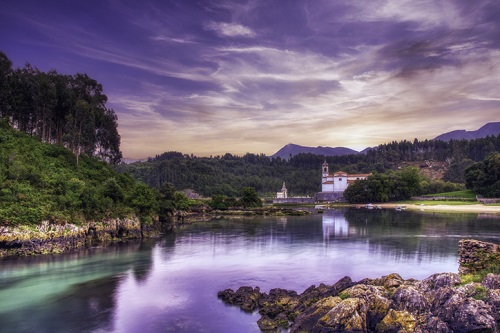
In the unlikely event that relaxing on these secluded beaches begins to pall, numerous scenic hikes along the Asturian coast provide opportunities to discover yet more tiny beaches lurking beneath the cliffs. A memorable phenomenon of this stretch of coast is the erosion of the cliffs creating surface holes or bufones, where waves crashing into the cliff foot emerge with violent force at the top. It’s a spectacle that is impressive and alarming, and best viewed from a safe distance.
Getting around by public transport here usually involves the slow but enjoyable FEVE (Renfe) narrow-gauge railway that plies the coast, with occasional diversions to inland settlements. It is irregular but inexpensive and ideal for a return trip after a long coastal walk.
Dining in Asturias remains mostly attuned to local rather than tourist demand. Menus are dominated by fish and shellfish, although they will usually include fabada, the Asturian stew of beans, blood sausage, chorizo, and pork belly that is far more delicious than the ingredients imply.
Other local menu highlights include bogavante con arroz, lobster with rice, with just a hint of saffron and lemon, or bonito, the white tuna that is prized almost as much in Asturias as it is in Japan.
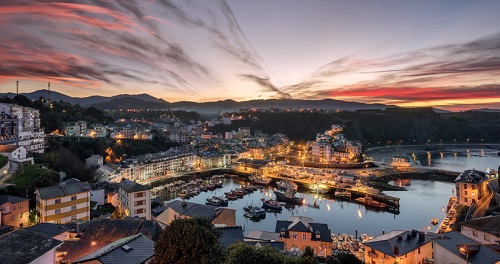
From every humble chiringuito to the smartest hotel restaurant, such as the Puebloastur Eco Resort Wellness and Spa, the Asturians often accompany their meals with cider, sidra, rather than wine. It is strong stuff, not very carbonated, and an acquired taste. Tradition dictates that waiters pour bottles into a glass from a great height to add air to the liquid. It’s not clear why they feel a need to do this behind their backs, but it means that every bar or restaurant in this vicinity is characterized by the scent of fermented apples. It’s all part of the distinctive charm of this beautiful part of Spain, a costa with a different way of life.
What are you waiting for? Take a look at some of our favorite hotels along the Cantabrian Coast and consider booking a trip this year! If you have any questions or are looking for recommendations in the region, feel free to ask in the comments. Gayola! (cheers)
RECOMMENDED: How To Get Cheaper Flight Tickets: 11 Proven Methods
More Spanish Travel Guides and Travel Inspiration
3 Weeks in Spain Itinerary for Adventurous Travelers
7-Day Spain Itinerary: Drive The Mediterranean Coast • Valencia, Alicante & More
Visit These Charming Spots in Spain If You Love Food and Wine
Visit Spain’s Canary Islands: Travel Resources & Logistics
Here’s Why You Should Visit Tarragona: Spain’s Ancient Port on the Mediterranean
The Sierra de Aracena: Jamon Iberico, Magestic Caves & Fine Wine
You are reading “Here’s Why You Should Visit Spain’s Costa Verde (Asturias), Northern Spain’s Beach Paradise ” Back To Top
best beaches in Spain, things to do in Europe, Europe travel ideas: best places to visit in the UK
If you enjoyed this guide, consider joining the Facebook Group to interact with other Winetravelers and for travel inspiration around the world, and be sure to follow along with us on Instagram.
